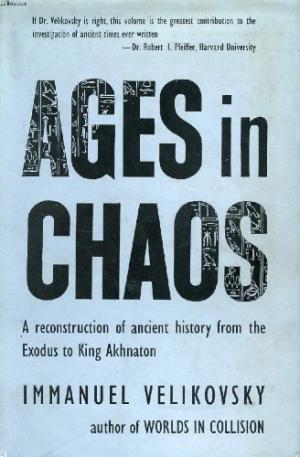Newly released
This book is new and will be uploaded as soon as it becomes available to us and if we secure the necessary publishing rights.

Ages in Chaos: A reconstruction of ancient history from the Exodus to King Akhnaton Book PDF
(0)
Author:
Immanuel VelikovskyNumber Of Reads:
131
Language:
English
Category:
HistorySection:
Pages:
417
Quality:
excellent
Views:
1231
Quate
Review
Save
Share
Book Description
Ages in Chaos is a book by the controversial writer Immanuel Velikovsky, first published by Doubleday in 1952, which put forward a major revision of the history of the Ancient Near East. Velikovsky had put forward his ideas briefly in Theses for the Reconstruction of Ancient History in 1945, but Ages in Chaos was his first full-length work on the subject.
A second volume was due for publication shortly after this but was postponed. Instead it was followed eight years later by Oedipus and Akhnaton. In the last two years of his life Velikovsky published a further two works on ancient history: Peoples of the Sea and Rameses II and His Time. At the time of his death he considered that completing his reconstruction of ancient history would require a further two volumes: The Assyrian Conquest and The Dark Age of Greece; these were never published in English, but the manuscripts have long been available online at the Velikovsky archive.
Velikovsky claimed in Ages in Chaos that the histories of Ancient Egypt and Ancient Israel are five centuries out of step. His starting point was that the Exodus took place not, as orthodoxy has it, at some point during the Egyptian New Kingdom, but at the fall of the Middle Kingdom. Velikovsky made heavy use in this and later works on ancient history of the concept of "ghost doubles": historical figures who were known by different names in two different sources (e.g. Egyptian and Greek) and were conventionally considered to be entirely different people living in different centuries, but who he proposed to be actually erroneously dated accounts of the same individuals and events.
Immanuel Velikovsky
Emmanuel Velikovsky (June 10, 1895 - November 17, 1979) was an independent Russian scholar who wrote a number of books reinterpreting the events of ancient history, notably the US bestseller Worlds in Collision, published in 1950. He previously contributed to the founding of the Hebrew University in Jerusalem in Palestine, and was a psychiatrist and psychoanalyst. Velikovsky's work is often cited as a typical example of pseudoscience and has been used as an example of a delimitation problem. His books use comparative myths and ancient literary sources (including the Old Testament) to say that the Earth suffered from disastrous close contacts with other planets (principally Venus and Mars) in ancient history. When placing Velikovsky among catastrophic theorists including Hans Bellamy, Ignatius Donnelly and Johann Gottlieb Radloff noted British astronomers Victor Klopp and Bill Napier. “Velikovsky is not the first of the new catastrophic theorists. Rather, he is the last in a series of traditional catastrophic theorists going back to the Middle Ages and possibly even further back.” Velikovsky has argued that electromagnetic effects play an important role in planetary mechanics. He also proposed a revised chronology of ancient Egypt, Greece, Palestine, and other cultures of the ancient Near East. The revised chronology aims to explain the so-called "dark age" of the eastern Mediterranean (1100–750 BC) and reconcile biblical history with mainstream archeology and Egyptian chronology. Velikovsky's theories were generally ignored or strongly rejected by the academic community. Nevertheless, his books often sold well and gained enthusiastic support in the general public, often accompanied by allegations of unfair treatment of Velikovsky by the traditional university community. The controversy surrounding his work and its reception is often referred to as the "Velikovsky Affair".
Book Currently Unavailable
This book is currently unavailable for publication. We obtained it under a Creative Commons license, but the author or publisher has not granted permission to publish it.
Rate Now
5 Stars
4 Stars
3 Stars
2 Stars
1 Stars
Ages in Chaos: A reconstruction of ancient history from the Exodus to King Akhnaton Quotes
Top Rated
Latest
Quate
Be the first to leave a quote and earn 10 points
instead of 3
Comments
Be the first to leave a comment and earn 5 points
instead of 3